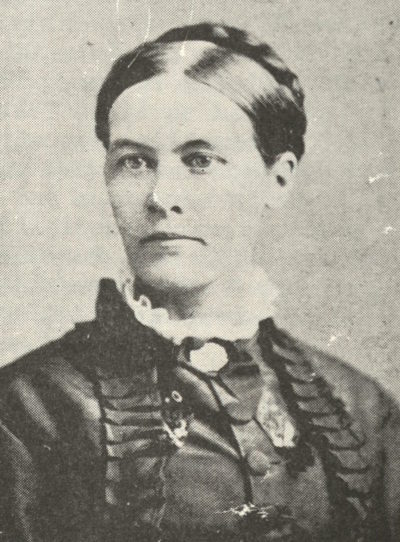
Phebe W. Sudlow was the first female superintendent of a public school system in the U.S., serving in that capacity for Davenport Community Schools from 1874 to 1878. This photo of Sudlow was published in “A History of Davenport’s Schools” by Mary A. Baker. A scan of it can be found online in a 2010 blog posted by the Davenport Public Library entitled “Equality through Education: Phebe W. Sudlow” at blogs.davenportlibrary.com.
By Jerry Harrington
On July 19, 1874, Phebe W. Sudlow stood before the Davenport School Board at an historic moment. For the first time in United States history, a female was on the brink of selection as superintendent of a public school system.
But Sudlow, strong-willed and eloquent, faced the all-male board with a firm objection. The proposed salary that was offered to her was much less than her male predecessor. This she simply would not accept.
“Gentlemen, if you are cutting the salary because of my experience, I have nothing to say,” she said in a clear, unmistakable tone, “but if you are doing this because I am a woman, I’ll have nothing more to do with it.”
That was that. The ball was now in the Davenport School Board’s court.
Facing this edict, board members voted unanimously to offer Sudlow the job — with a salary equal to that of a male. Only then did Sudlow accept. This was not the first time nor the last this remarkable Iowa educator would make history by breaking gender barriers. Sudlow had earlier earned a job as the nation’s first female principal of a municipal school (though unconfirmed historically) and would later become the first woman elected president of the Iowa State Teachers Association. Later still, she would be named the first female faculty member at the University of Iowa in Iowa City.
Sudlow’s vocational advances for women’s equality joins other landmark accomplishments by women in Iowa history in the 19th century. She stands astride Arabella Mansfield, the nation’s first female lawyer who passed the Iowa bar in 1869, and Mary B. Hickey Wilkinson, 1873 University of Iowa law school graduate who was the first woman in the U.S. to earn a law degree. Sudlow’s example of women’s advancements in education — certainly made possible by her own personal determination and ambition — also reflects a broader willingness within post-frontier Iowa to accept women within its professional ranks.
Lifelong learner
Ironically, Sudlow’s trail-blazing career accomplishments were made by a woman with little formal education. She came of age in the mid-19th century before academic institutions commonly bestowed advanced degrees in the Midwest and then only rarely for women. Sudlow was a lifelong, self-taught learner with little beyond a high school education, but gifted with an immense eagerness to learn. When asked where she received her education, Sudlow replied, “All along the way.”
Born in Poughkeepsie, N.Y., on July 11, 1831, one of six children to Hannah and Richard Sudlow, she was four years old when her family moved to Nelsonville, Ohio, where Sudlow began school in a log cabin. She attended an academy in Athens, Ohio, and began her teaching career at age 15 in the same log cabin where she was first taught. Following her father’s death in 1855, she moved to Rockford, Ill., to live with her brother and, a year later, the family moved to Iowa’s Round Grove in Scott County, where she continued teaching.
TO READ THE ENTIRE STORY AND OTHER FASCINATING STORIES ABOUT IOWA HISTORY, subscribe to Iowa History Journal.
